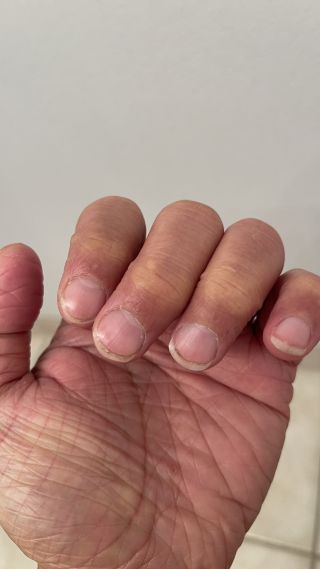Body-Focused Repetitive Behaviors
A Cure for Nail-Biting
A Personal Perspective: I have been a nail-biter for 40 years—until now.
Posted January 5, 2023 Reviewed by Abigail Fagan

I’ve been biting my nails for 40 years. I had given up on trying to break this bad habit. Colleagues would encourage me to stop, saying it was unprofessional. My wife would suggest I stop citing past infections due to my nail-biting. I even tried getting manicures, thinking if I cared and paid for them, I’d take better care of my nails. But nothing worked.
I had considered putting foul-tasting coating over the nails as a form of aversive therapy but decided if I couldn’t do it naturally, it probably wouldn’t work for me.
As I began paying more attention to not only my own nail-biting but others, I realized I wasn’t alone. A number of my clients also did it. The current literature estimates the prevalence of nail-biting at 20% to 30% of the general population (Halteh et al., 2017, Pacan et al., 2014). The Diagnostic and Statistical Manual of Mental Disorders, Fifth Edition, categorizes chronic nail-biting as other specified obsessive-compulsive disorder (OCD), classified in the same group as compulsive lip biting, nose-picking, and hair-pulling (American Psychiatric Association, 2013).
Regardless of the statistics or how it’s classified, it’s been a perpetual problem that I’ve even mentioned in therapy over the years, but nothing seemed to work—until now.
Past attempts of me trying to white-knuckle it led to a week of success but then my old habits kicked in. When I tried to think about it, it was easy to attribute it to stress or anxiety. I resigned myself to being a lifelong nail-biter.
But in recent months, I’ve come across the popular therapy technique known as IFS (Internal Family Systems) that is quite different in its approach. Instead of hating the nail-biting part of myself, the approach is to be kind to it. “No bad parts” is one way it can be summed. This was initially perplexing and counterintuitive, as I viewed my nail-biting part with disdain, frustration, and shame.
But as I learned more about this approach, it started to not only make sense cognitively but also practically by giving me a sense of freedom from the need to bite my nails. I first set aside all those negative feelings I had towards the nail-biting part. Once that was accomplished, I began talking to this part like a separate person I was curious about. Curiosity is key because if I was contemptuous or upset with this part, it would not reveal what it wanted me to know about its origin.
Somehow in this process, it revealed to me an image of my childhood. Dark nights, home alone with my two younger brothers in a crime-ridden neighborhood. My parents were away at work, and we were left to fend for ourselves. The feeling associated with the image was one of fear, and I realized nail-biting began around this age to assuage my fears. Part of this approach includes not only separating from the part to better understand it but also thanking it for its original positive intent. This was also a stunning reversal of everything I had known about therapy. I obliged and thanked the nail-biting part for taking care of me at a young age. I also recognized that it obviously continued for decades since then and the part has become exaggerated and no longer effective in adult life. But it wasn’t until I truly appreciated the protective function of my past did it feel validated and understood.
It’s only been two months since I last bit my nails, but it feels like there’s been a major shift internally based on this intriguing approach. My wife is shocked my nails have grown this long and as a gift, got me a gift certificate for a manicure that I recently redeemed. Unlike the last manicure (more than 20 years ago) which was done as an attempt to stop my nail-biting, this manicure was the result of having stopped.
If there’s one vital lesson I’ve learned from this experience over the past two months, it’s that we have “no bad parts” within us (rage, eating disorders, addictions, nail-biting, etc.) but if these parts are not given compassion, empathy, and understanding, they can potentially continue to torment us until we give them the appreciation and validation that’s been absent for years—or decades, in my case of nail-biting.


